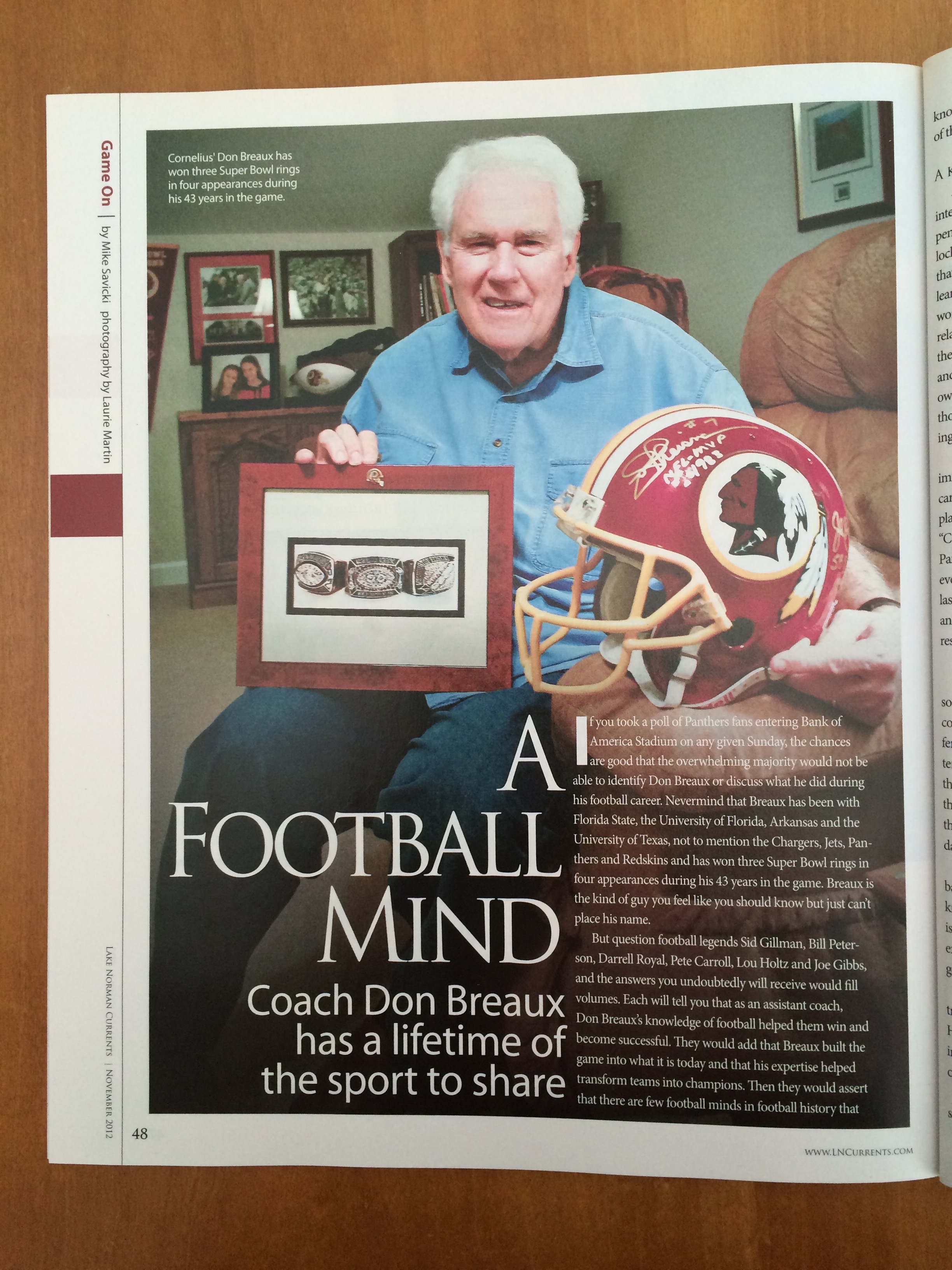A Football Mind
Coach Don Breaux has a lifetime of the sport to share
By Mike Savicki
If you took a poll of Panther fans entering Bank of America Stadium on any given Sunday, the chances are good that the overwhelming majority would not be able to identify Don Breaux or discuss what he did during his football career. Never mind that Breaux has been with Florida State, University of Florida, Arkansas and the University of Texas, not to mention the Chargers, Jets, Panthers and Redskins, and has won three Super Bowl rings in four appearances during his 43 years in the game. Breaux is the kind of guy you feel like you should know but just can’t seem to understand why you can’t place his name.
But question football legends Sid Gillman, Bill Peterson, Darrell Royal, Pete Carroll, Lou Holtz and Joe Gibbs, and the answers you undoubtedly will receive would fill volumes. Each will tell you that as an assistant coach, Don Breaux’s knowledge of football helped them win and become successful. They would add that Breaux built the game into what it is today, and his expertise helped transform teams into champions. Then they would assert that there are few football minds in football history who know more about the intricacies and complexities of the game than Breaux.
As I waited for coach Breaux to arrive for our interview on the early fall afternoon that just happened to coincide with the end of the NFL referee lockout, I wondered what I could possibly ask him that might give him pause for thought. I wanted to learn about how he helped shape the systems that won Super Bowls and I wanted to learn about his relationships with some of the greatest names in the game, including his lifelong kinship as a friend and assistant to Redskins legend turned NASCAR owner Joe Gibbs; but I knew he had been asked those questions before. So to say I felt overwhelmingly unprepared would be an understatement.
“See this training camp playbook?” Breaux immediately exclaimed as he walked towards me carrying a thick three ring binder, a pile of game plans, play charts and lined pads full of notes. “Can you believe a rookie like Cam [Newton, Panthers starting quarterback] absorbed a book even more complex than this in just a few weeks last season after the lockout? It shows his passion and how good of a mind he has. I have a lot of respect for him.”
And like that, our interview hit full stride.
“Football is such a great game and there are so many more facets to it than people realize,” he continued as we were led to a corner table. “Different teams have different systems and different terminology, but there is a universal language in the sport. Sure, every team has about 120 plays in their book, but taking a blank sheet and picking the right ones for every single game is an incredibly daunting task.
He added, “You can’t forget that defensive football is about recognition, and the good coaches will know you better than you know yourself. Football is more than a chess game. It’s like the ultimate exciting reality show. Just when you think you’ve got it planned out, you’re going to be surprised.”
It didn’t take long for Breaux to successfully transform our lunch table into his makeshift office. He opened the 2007 Washington Redskins Training Camp Playbook, arranged game plans and play cards, then got down to work.
As I watched him in action, I knew I was with someone whose knowledge head coaches appreciated, valued and counted on when games and seasons were on the line. We discussed defenses, player adjustments, check downs, zone blitzes, pass routes, shifts, motions, protections, personnel groupings, pass “shapes” and audibles. I finally put down my pen and just listened.
Breaux then began sharing stories. He smiled and told me of how Bill Peterson, the former FSU head coach, once had all his players watch game film of a loss and, with pencil and paper, write down every mistake they each made throughout the entire game. Peterson told them to take their finished assignments and meet him on the practice field. When a hearse carrying an open casket drove through the gates, Breaux realized what was happening.
“In football, you’ve got to bury your mistakes, and that’s exactly what the coach had them do,” he joked.
Breaux also shared the story of how a certain Redskins running back named John Riggins once approached him before a Super Bowl and asked if he knew what the Super Bowl rushing record was at the time.
“I didn’t know but I found it out very quickly for John,” Breaux shared. “What that question told me was that Riggins was thinking about doing something special that day. Riggins wound up making a key play for the win. Putting him in the position to succeed is what coaching is about.”
Nearly ninety minutes into our interview, I finally had the opportunity to ask my first question.
“We haven’t had lunch yet, coach, would you like to see what’s on the menu?” I queried.
“What are you having? Just order me the same thing,” he replied as he began diagramming zone defenses.
When our food arrived, Breaux was in the middle of telling me about the lessons he learned as an assistant coach. From Darrel Royal he learned patience, poise and composure. Lou Holtz taught him how to build confidence in players and teams as games drew closer. And Joe Gibbs taught him the importance of gathering the facts, not jumping to conclusions, making sound decisions and defending a position.
Breaux’s knowledge of football and athletic performance belongs in the hall of fame.
Now three years retired from coaching, Don Breaux spends his time fishing on Lake Norman and the other bodies of water near his Cornelius home. He duck hunts near his Southwest Louisiana birthplace. And, on weekends, you’ll find him glued to the television watching as many college games as he can in addition to at least three NFL games each weekend. He plays fantasy football with his three grandsons, too.
Near the end of our interview, Breaux asked me if he had rambled too much.
I thought to myself. No, coach, not at all. For yours is a football mind that has shaped a game and created legends. I only hope I can somehow share your story so more people will know who you are.
“So where are you heading next?” I asked as we left the restaurant later that afternoon.
“Just off to talk a little more football,” he concluded.
This article was originally published in Currents Magazine in 2012.

